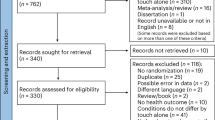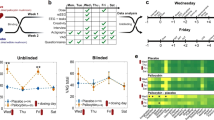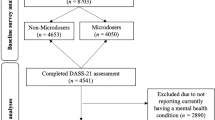Abstract
Objective:
Personality influences lifestyle behaviors. Therefore, certain personality traits could contribute to obesity and the response to behaviorally based weight loss therapy.
Purpose:
The aims of this study were to test the hypothesis that personality characteristics differ between lean and obese persons in the community, obese persons in the community and obese persons seeking weight loss therapy by enrolling in a comprehensive weight loss program, and in obese persons who were successful and unsuccessful in achieving behavioral therapy-induced weight loss.
Methods:
The Temperament and Character Inventory was administered to 264 lean (body mass index (BMI) <25 kg/m2) and 56 obese (BMI⩾35 kg/m2) subjects from the St Louis community and 183 obese patients (BMI=44±10 kg/m2) enrolled in the Washington University Weight Management Program (WUWMP), which involved weekly group behavioral therapy and diet education sessions for 22 weeks.
Results:
Compared with lean subjects, obese subjects in the community scored higher in novelty seeking (19.7±5.9 vs 16.2±6.0, P<0.05), lower in Persistence (4.1±1.8 vs 4.8±1.7, P<0.05) and lower in self-directedness (32.1±7.6 vs 34.3±6.6, P<0.05.) Patients enrolled in the WUWMP scored higher than obese persons in the general population in both Reward Dependence (17.1±4.2 vs 15.7±4.3, P<0.05) and cooperativeness (36.9±5.4 vs 34.5±6.2, P<0.05). Patients who were successful in losing weight (>10% weight loss) after 22 weeks of behavioral therapy scored lower in novelty seeking than those who were unsuccessful in losing weight (<5% weight loss) (17.6±5.9 vs 20.2±5.9, P<0.05).
Discussion:
These results suggest that personality traits differ between lean and obese persons, and between obese persons who enroll and who do not enroll in a comprehensive weight management program. Moreover, high scores in novelty seeking are associated with decreased success in achieving behavioral therapy-induced weight loss.
This is a preview of subscription content, access via your institution
Access options
Subscribe to this journal
Receive 12 print issues and online access
$259.00 per year
only $21.58 per issue
Buy this article
- Purchase on Springer Link
- Instant access to full article PDF
Prices may be subject to local taxes which are calculated during checkout
Similar content being viewed by others
References
Ogden CL, Carroll MD, Curtain LR, McDowell MA, Tabak CJ, Flegal KM . Prevalence of overweight and obesity in the United States, 1999–2004. JAMA 2006; 295: 1549–1555.
Serdula MK, Mokdad AH, Williamson DF, Galuska DA, Mendlein JM, Heath GW . Prevalence of attempting weight loss and strategies for controlling weight. JAMA 1999; 282: 1353–1358.
Wadden TA, Frey DL . A multicenter evaluation of a proprietary weight loss program for the treatment of marked obesity: a five year follow-up. Int J Eat Disord 1997; 22: 203–212.
van den Bree MBM, Przybeck TR, Cloninger CR . Diet and personality: associations in a population-based sample. Appetite 2006; 46: 177–188.
Bjorvell H, Edman G, Rossner S, Schalling D . Personality traits in a group of severely obese patients: a study of patients in two self-chosen weight reducing programs. Int J Obes 1985; 9: 257–266.
Bjorvell H, Gunnar E, Daisy S . Personality traits related to eating behavior and weight loss in a group of severely obese patients. Int J Eat Disord 1989; 8: 315–323.
Bjorvell H, Gunnar E . Characteristics of drop-outs from a long-term behavioral treatment program for obesity. Int J Eat Disord 1989; 8: 363–368.
Bjorvell H, Aly A, Langius A, Nordstrom A . Indicators of changes in weight and eating behavior in severely obese patients treated in a nursing behavioural program. Int J Obes 1994; 18: 521–525.
Jonsson B, Bjorvell H, Levander S, Rossner S . Personality traits predicting weight loss outcome in obese patients. Acta Psychiat Scand 1986; 74: 384–387.
Jonsson B, Bjorvell H, Espmark S, Rossner S . Psychiatric determinants of weight changes in jaw-fixed obese patients. Acta Psychiatr Scand 1986; 73: 196–202.
Walker SCP II, Ericsson M, Linder J, Nilsson T, Goodrick GK, Foreyt JP . Personality and the prediction of weight loss and relapse in the treatment of obesity. Int J Eat Disord 1999; 25: 301–309.
Schalling D, Edman G . The Karolinska Scales of Personality (KSP) Manual: An Inventory for Assessing Temperament Dimensions Associated with Vulnerability for Psychosocial Deviance. Department of Psychiatry, Karolinska Institute: Stockholm, Sweden, 1993.
Schalling D, Edman G, Asberg M . Impulsive cognitive style and inability to tolerate boredom: psychological studies of temperamental vulnerability. In: Zuckerman M (ed). Biological Bases of Sensation Seeking, Impulsivity, and Anxiety. Erlbaum: Hillsdale, NJ, 1983, pp 123–145.
Cloninger CR, Svrakic DM, Przybeck TR . A psychobiological model of temperament and character. Arch Gen Psychiatry 1993; 50: 975–990.
Svrakic DM, Whitehead C, Przybeck TR, Cloninger R . Differential diagnosis of personality disorders by the seven-factor model of temperament and character. Arch Gen Psychiatry 1993; 50: 991–999.
Cloninger CR, Przybeck TR, Svrakic DM, Wetzel RD . The Temperament and Character Inventory (TCI): A Guide to its Development and Use. Center for Psychobiology of Personality, Washington University: St Louis, MO, 1994.
Brewerton TD, Hand LD, Bishop Jr ER . The tridimensional personality questionnaire in eating disorder patients. Int J Eat Disord 1993; 14: 213–218.
Bulik CM, Sullivan PF, Weltzin TE, Kaye WH . Temperament in eating disorders. Int J Eat Disord 1995; 17: 251–261.
Kleifield EI, Sunday S, Hurt S, Halmi KA . The Tridimensional Personality Questionnaire: an exploration of personality traits in eating disorders. J Psychiatr Res 1994; 28: 413–423.
Waller DA, Gullion CM, Petty F, Hardy BW, Murdock MV, Rush AJ . Tridimensional personality questionnaire and serotonin in bulimia nervosa. Psychiatry Res 1993; 48: 9–15.
Fassino S, Daga GA, Piero A, Leombruni P, Rovera GG . Anger and personality in eating disorders. J Psychosomat Res 2001; 51: 757–764.
Fassino S, Leombruni P, Piero A, Daga DA, Amianto F, Rovera G et al. Temperament and character in obese women with and without binge eating disorder. Compr Psychiatry 2002; 43: 431–437.
Bulik CM, Sullivan PF, Carter FA, McIntosh VV, Joyce PR . Predictors of rapid and sustained response to cognitive-behavioral therapy for bulimia nervosa. Int J Eat Disord 1999; 26: 137–144.
Cloninger CR . Biology of personality dimensions. Curr Opin Psychiatry 2000; 13: 611–616.
Cloninger CR, Svrakic DM, Przybeck TR . Measurement of temperament and character in mood disorders: a model of fundamental stated as personality types. J Affect Disord 1998; 51: 21–32.
Jacobs SB, Wagner MK . Brief report: obese and non-obese individuals: behavioral and personality characteristics. Addict Behav 1984; 9: 223–226.
Acknowledgements
We thank Shane Cotter and the staff of the Washington University Weight Management Program for their assistance, and the study subjects for their participation.This study was supported by National Institutes of Health Grants MH60879 and DK 56341.
Author information
Authors and Affiliations
Corresponding author
Rights and permissions
About this article
Cite this article
Sullivan, S., Cloninger, C., Przybeck, T. et al. Personality characteristics in obesity and relationship with successful weight loss. Int J Obes 31, 669–674 (2007). https://doi.org/10.1038/sj.ijo.0803464
Received:
Revised:
Accepted:
Published:
Issue Date:
DOI: https://doi.org/10.1038/sj.ijo.0803464
Keywords
This article is cited by
-
Integrating Pharmacotherapy and Psychotherapy for Weight Loss
Journal of Health Service Psychology (2023)
-
Personality, weight loss and obesity-related well-being post-bariatric surgery
Eating and Weight Disorders - Studies on Anorexia, Bulimia and Obesity (2022)
-
Are Morbid Obesity and Insomnia Related? Investigating Associated Factors in a Clinical Setting
Journal of Clinical Psychology in Medical Settings (2020)
-
Personality and psychopathology differences between bariatric surgery candidates, subjects with obesity not seeking surgery management, and healthy subjects
Eating and Weight Disorders - Studies on Anorexia, Bulimia and Obesity (2019)
-
Are Personality Characteristics as Measured by the Temperament and Character Inventory (TCI) Associated with Obesity Treatment Outcomes? A Systematic Review
Current Obesity Reports (2018)



